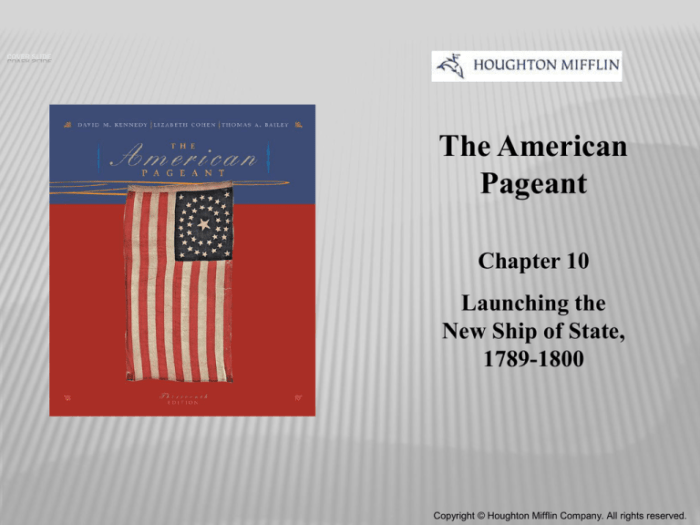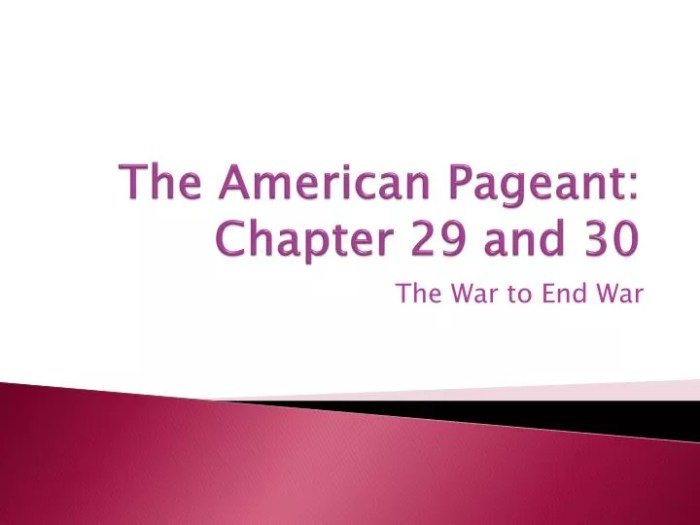As American Pageant Chapter 18 notes take center stage, this opening passage beckons readers into a world of historical significance. From the cataclysmic events of World War I to the transformative era of the Progressive Movement, the Roaring Twenties, the Great Depression, and the pivotal battles of World War II, this chapter provides a comprehensive exploration of the major events that shaped American society and culture during the early 20th century.
Delving into the intricate causes, turning points, and far-reaching consequences of these historical epochs, American Pageant Chapter 18 notes offer a profound understanding of the forces that have molded the United States into the nation it is today.
American Pageant Chapter 18: The Great War and Its Aftermath

World War I, the first global conflict, had profound implications for American society and culture. This chapter explores the causes, major battles, and impact of the war, as well as the transformative effects it had on the United States.
Causes and Origins of World War I
The war’s roots lay in a complex web of factors, including rising nationalism, imperialism, and military alliances. Key events such as the assassination of Archduke Franz Ferdinand and the German invasion of Belgium triggered the outbreak of hostilities.
Major Battles and Turning Points
The war was characterized by bloody trench warfare and technological innovations. Major battles included the Battle of the Marne, the Battle of Verdun, and the Battle of the Somme. The entry of the United States in 1917 marked a turning point, helping to secure an Allied victory.
Impact on American Society and Culture
The war had a significant impact on American life. It led to increased government power, the expansion of industry, and the emergence of new social and cultural norms. The war also had a lasting impact on the nation’s foreign policy.
The Progressive Era

The Progressive Era, from the late 19th century to the early 20th century, was a period of significant social and political reform in the United States. Key leaders included Theodore Roosevelt, Woodrow Wilson, and Jane Addams.
Key Ideas
Progressive reformers sought to address issues such as corruption, inequality, and social injustice. They believed in government regulation, consumer protection, and expanded social welfare programs.
Major Reforms
- Pure Food and Drug Act
- Clayton Antitrust Act
- Federal Reserve System
- Progressive income tax
- Women’s suffrage
Impact on American Politics and Society, American pageant chapter 18 notes
The Progressive Era transformed American politics and society. It strengthened the federal government, expanded the role of citizens in government, and improved the lives of many Americans.
The Roaring Twenties
The Roaring Twenties, the decade following World War I, was a period of economic prosperity and social change. It was characterized by rapid industrialization, consumerism, and the rise of mass culture.
Economic and Social Changes
The economy boomed, driven by technological advancements and mass production. New industries such as automobiles and entertainment flourished. Urbanization and immigration increased.
Prohibition
The 18th Amendment, enacted in 1920, prohibited the sale, manufacture, and transportation of alcohol. Prohibition had unintended consequences, including the rise of organized crime and the smuggling of illegal alcohol.
Mass Culture and Consumerism
The Roaring Twenties witnessed the rise of mass culture, including movies, radio, and sports. Advertising became pervasive, encouraging consumerism and the purchase of goods.
The Great Depression: American Pageant Chapter 18 Notes

The Great Depression, which began in 1929, was the worst economic downturn in American history. It caused widespread unemployment, poverty, and social unrest.
Causes
The Depression’s causes included overspeculation in the stock market, a decline in consumer spending, and a collapse in international trade.
Impact on American Society and Culture
The Depression had a devastating impact on American society. It led to mass unemployment, homelessness, and hunger. It also eroded confidence in the government and the economy.
New Deal Policies
President Franklin D. Roosevelt implemented the New Deal, a series of policies designed to combat the Depression. These policies included public works projects, social welfare programs, and financial reforms.
World War II
World War II, the second global conflict, began in 1939 and ended in 1945. It was the most destructive war in history, involving over 30 countries.
Causes and Origins
The war’s origins can be traced to the rise of fascism and Nazism in Europe and Japan’s aggression in Asia. The invasion of Poland by Germany in 1939 triggered the outbreak of war.
Major Battles and Turning Points
The war was fought on multiple fronts, including Europe, Asia, and the Pacific. Key battles included the Battle of Britain, the Battle of Stalingrad, and the Battle of the Bulge. The United States’ entry into the war in 1941 after the attack on Pearl Harbor marked a turning point.
Impact on American Society and Culture
World War II had a profound impact on American society. It led to the mobilization of the economy, the rationing of goods, and the expansion of the federal government. The war also accelerated social changes, such as the increased role of women in the workforce.
Popular Questions
What are the key causes of World War I?
The assassination of Archduke Franz Ferdinand, the complex system of alliances, militarism, imperialism, and nationalism.
How did the Progressive Era impact American society?
The Progressive Era brought about significant reforms in areas such as labor, education, healthcare, and government regulation.
What were the major economic and social changes during the Roaring Twenties?
The Roaring Twenties witnessed rapid economic growth, technological advancements, and a shift in social norms.